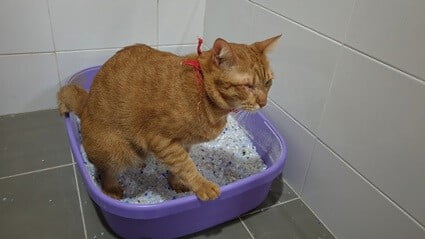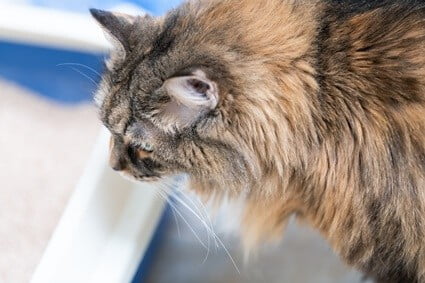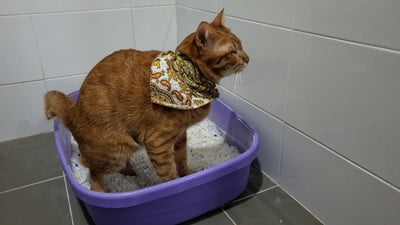A senior cat should empty its bowels no less than once a day. Any less than that regularity suggests that your elderly cat is constipated.
Keep your cat regular with an age-specific diet and exercise. Provide stool softeners or mild laxatives to relieve constipation. You can also encourage cats to eliminate manually. Rubbing a damp washcloth on a cat’s anus mimics the sensation of a mother cat licking a kitten.
You can usually treat feline constipation at home, but don’t allow the problem to go unresolved for longer than 24 hours. With dietary and lifestyle changes, your older cat should start to go to the toilet regularly.
How to Tell if A Cat Is Constipated
As stated, a cat should empty its bowels daily. If your older cat goes 24 hours with pooping, it’s likely to be constipated. Signs of a constipated senior cat include:
- Not visiting the litter box
- Swollen, distended abdomen
- Straining and crying while defecating
- Hunched posture and reluctant movement
- Releasing small, hard feces
- Blood or mucus in the feces
- Vomiting after eating
- Lethargy
- Loss of appetite and weight loss
Ensure that your cat is unable to defecate. It may be able to go to the toilet but is unwilling to do so. This may be because your cat has developed a fear of its litter box, so it chooses to eliminate elsewhere or holds in its waste.

Why Is My Older Cat Not Using Its Litter Box Anymore?
A cat can develop a fear of its litter box that is medical or psychological in nature. The most common explanations for this include:
- It hurts to defecate
- The litter box hasn’t been cleaned
- The litter within has changed scent or texture
- There is too much litter in the box
- The litter box is in a noisy area
- The litter box has been moved
- The cat has outgrown its litter box
- Another cat is using the litter box
Cats are fussy about their litter box, so it must meet these criteria:
- Cleaned no less than once a day
- Located in a quiet area, away from noise or footfall
- Unique to the cat. Multiple cats require multiple litter boxes
- No more than two inches of a familiar, unscented litter
- Large enough for the cat to fit into comfortably
If you are confident that your litter box is not the problem, the issue could be a urinary tract infection. UTIs make elimination painful. Your cat may think that it’s the litter tray that’s hurting it and avoid it. Consequently, it will hold in its waste and become constipated.
As the Journal of Feline Medicine and Surgery explains, feline UTIs frequently reoccur. This means that antibiotics may only provide temporary relief from the problem.
A cat without a UTI may still avoid its litter box due to discomfort. Constipation is painful as the stool is so hard and difficult to pass.
Old Cat Not Going To Toilet
A senior cat faces a higher risk of constipation for the following reasons:
- Prone to joint and leg stiffness due to arthritis
- Exercise less frequently, leading to obesity
- Weaker immunity and more likely to get intestinal problems
If your cat cannot make it into the litter box, it will hold onto its feces for longer. This leads to harder waste and constipation in senior cats.
What Causes Constipation in Elderly Cats?
Constipation has several causes that vary in severity. The most common explanations include:
- Obstruction to the colon, perhaps due to hairballs
- Inability to digest food
- Excessive protein in the diet
- Dehydration
- Insufficient exercise
- The side effects of medication or anesthesia
- Stress and trauma
If your cat is dehydrated, it may have kidney disease. One in three geriatric cats (aged 10+) experience some degree of renal failure.
According to the Journal of Small Animal Practice, kidney problems are also often linked to hyperthyroidism. This is another medical problem that can lead to feline constipation.
Older cats have more brittle bones, and a fractured pelvis is a common injury. As Vet Compendium explains, a fractured pelvis leads to a narrowed colon. This makes defecation difficult, or even impossible, in some cases.
As per the BMJ, your cat may have megacolon. Megacolon is the dilation or restricted movement of the digestive tract.
How to Get an Older Cat To Poop
Here are some ways to relieve a senior cat’s constipation:
Regular Exercise
Exercise is key to keeping a cat regular. Older cats can become increasingly lethargic and sleep for longer, which can lead to constipation. A lack of movement means that the digestive tract is also not getting a workout.
If your cat still enjoys playtime, encourage this behavior. Use toys that will spark your cat’s hunting instincts. Laser pointers, clockwork mice, and feathers on a string can all get a cat moving and jumping.
Your older cat may have lost interest in play. Provide physical stimulation throughout the house, such as cat trees. If your cat is food-focused, make it work harder to be rewarded with a food-based treat.
Manual Relief
Mother cats lick the anus of their young to stimulate elimination. Obviously, this won’t be the case for a senior cat. However, you can replicate the experience by doing the following:
- Run a soft towel or washcloth under warm water until it’s damp
- Place your cat in its litter box and rub the cloth on its anus
- Complete a steady, circular motion that lasts for up to one minute
You will know if this is working as the cat will start to spasm. It means that the cat’s colon is being stimulated, leading to your cat going to the toilet.
Dietary Changes
Older cats need a specialist diet. Ensure that your cat’s diet provides a healthy balance of protein and fiber. Do not sacrifice fiber for protein, as fiber is what keeps a senior cat’s bowels moving frequently.
Older cats will find wet food easier to digest than kibble. If your cat sustains itself purely on kibble, consider introducing wet food to its diet. A little kibble is fine, but it will be harder for the cat to pass.
Even if your cat is constipated, you should still change its food gradually as an immediate switch can lead to a stomach upset. While diarrhea will encourage elimination, it can leave your cat dehydrated, leading to constipation in the future.
Water Consumption
Encourage your cat to drink more water if it is eliminating irregularly. Cats often fail to consume enough liquids. Oftentimes, this is because cats are fussy. Too much or too little water in a bowl can discourage fluid consumption. Also, many cats are distrustful of static water.
Consider getting your feline a water fountain. Cats enjoy lapping from a constant, fresh water supply. Alternatively, regularly refill your cat’s bowl. Do not leave your cat’s water too close to food, either. The smell of food contaminates water from a cat’s perspective.
Natural Stool Softeners
Constipation is often caused by a cat’s stool hardening inside the body, making it hard for the cat to eliminate. It will be painful, and waste will be released in small quantities. There are various natural remedies:
- Olive oil: Two teaspoons mixed with cat food will act as a mild laxative.
- Tinned pumpkin: Tinned pumpkin is also a natural laxative, and can be offered straight from the tin. Ensure the pumpkin is pure and not spiced.
- Leafy greens: Leafy greens are high in fiber and will stimulate your cat’s digestion—mix vegetables with your cat’s food.
- Cow’s milk: Most cats are lactose intolerant. The cat’s body will reject the milk and eject it as waste. This could lead to diarrhea, though.

Medical Intervention
Vets can prescribe medical-grade laxatives. You will be given strict instructions surrounding the dosage, which must not be exceeded.
A vet may give your cat an enema to avoid invasive surgery. This will clear the cat’s digestive tract. This shouldn’t be attempted at home.
Surgery is a last resort for a senior cat due to the risks involved. Besides, constipation is a common side effect of anesthetics. Surgery will only be considered if your cat has a foreign object blocking its colon.
How to Keep a Senior Cat Regular
To make sure a senior cat stays regular, take the following steps:
- Keep your cat active
- Avoid stress triggers for your cat
- Provide an appropriate diet, including plenty of water
- Check for any injuries
- Manage your cat’s weight and mobility issues
- You should groom your cat to minimize hairballs
- Regular health check-ups
There are a variety of reasons why older cats get constipated. These range from physical limitations to digestive issues due to age. If several days have elapsed without your cat going to the toilet, it should be examined by a vet.


Thankyou I have just been reading all advice on this page . I have found it VERY helpful, my cat is constipated this last 3 days, I will take to the vets tomorrow, she is 13.
we adopted a half persian and half God nows what but she is beautiful old lady and she is now 18 yrs old. i always check her box for stools and when i dont see any i know she is constipated because she does not play anymore, she eats and sleeps so what i do is rub her tummy take her to her box and massage her tummy until she poops a little. then i let let her be for a little bit and then i do it again until she poops again. poor baby. i just gave her two teaspoons of olive oil to see if that helps. i hope so because i know she is probably suffering but she never complains. 🙁
Hello Richard, I need help advice, I have a 10 year old cat who came down sick, Lost alot if weight, drinks alot, took him to a Value Pet Clinic ended up paying $867! 3 xrays, blood work & shaved around his butt hole gave amoxicillin for 2a day for 10 days. When I went back to pick him up Dr. Wanted to do a ultra sound & ship his blood work off for diabetic testing, wanting another $157. I declined that since I already gave him $867! Dr gave me a squirt bottle of something to spray his bottom with 2x A day for 7 days. he said it looked like it was cut with something sharp. Red, swollen. He has had No poop for 7 days now. How can I treat him to get him to deficate? He does not like to play.
Our 24 year old lord Charlie cat is constipated he is a very elderly gentleman and gets to stressed to go to the vets can you recommend any thing we can give him worried owners
Twenty-four? Wow! I thought my 19 year old cat was old.
I was very lucky I had two cats the lived to 26 years old. Both came from rescue centers another I had to let go as she was crippled with arthritis.
I did not realise that she was also almost blind and deaf. She used my scent to find and follow me around the house.
Cats are the most amazing actors covering up health issues.
Roll on 26+ for your cat; luckily none of my cats had bowel problems until my latest cat who is just 7 or maybe 9 – I think. Inherited from family who died.
I am trying the add veg and fruit to see what she will accept for fibre.
Happy Christmas and New Year. Jill
My senior seems to be benefitting from the addition of a Probiotic. I’ve also upgraded her water from sink to a better bottled water, which has instantly made a difference–apparently as a senior she can taste the difference between the water that comes out of a fountain and the water I also prefer to drink.
my 18 year old cat eats Temptations dry cat food but poops it out whole, not all of it but some of it. I gave him 5 Temptations treats and he pooped them all out whole. What could be wrong? I tried just about all the wet ones and he won’t eat them. I also tried other dry foods but he won’t eat them. He poops, drinks lots of water and eats some of his dry food. Seems to be very picky. I rescued him so I don’t know much about him.
I would check for kidney disease. Kidney failure is indicated by lots of water consumption and urination. Kibbles/dry treats can worsen the condition. Ask for Hills k/d special diet, also available as wet food. Redford has dry products that are nutritious and quite safe. Your kitty needs a highly digestible food that appeals to him. He may reject food if there’s a build-up of toxins in his system.
Hi, Richard. Thank you for all this wonderful information! My 18.5 yo Devon Rex is suffering from constipation after switching his food (he started vomiting violently after consuming his regular diet – the lot# was different than previous and so don’t trust the company as I tried again after a week and the same reaction happened). He’s now on Green JuJu pork, complete (it’s for dogs but they said it was also appropriate for cats – though not understanding why they didn’t list cats on the label, they gave me an answer that seemed logical at the time. Not sure now.) The label reads:
Calorie Content
4700 kcal/kg
213 kcal/cup
Guaranteed Analysis
As Fed
Protein: 50.5%
Fat: 33.6%
Fiber: 1.5%
Moisture: 2.8%
Once Rehydrated
Protein: 15.2%
Fat: 10.1%
Fiber: 0.5%
Moisture: 74.3%
Calcium / Phosphorus: 1.4 : 1
Omega 3 to 6 ratio: 1 : 8
He is only taking 1/2 C for the day (he consumes their salmon bites as well in the morning and their topper of organs/beets/other (can’t remember all ingredients off hand). I’ve also been giving him pumpkin and tried freshly ground wheat dissolved in water. He gets extra water as well due to the food being freeze-dried. He’s currently on his second consecutive round of ‘leaky gut protocol’ from Adored Beast which contains a lot of pre/probiotic treatments, and has not had any shots since he was 8; the last pharma item was antibiotics 2 years ago.
Long – very long (sorry) – story short…what can I give him that will work quickly? Mineral oil? Castor Oil? How much? He’s 10lbs-ish (a bit heavier with the constipation :(.
Two, 16 y/o F kitties. Severe constipation in both. I regret giving them only processed, dry cat food for first decade of their lives. They didn’t do well on canned catfood & I became weary of dodging recalls and finding sharp bones & white mold on top of costly canned foods (Nulo). Began making their food with roasted organic chicken, giblet broth, canned pumpkin, homemade bone broth & added taurine/amla. They LOVE it. Their fur/eyes look great. The crippling bouts of arthritis(one cat) are GONE but the constipation continues to worsen. Also feed them sardines, canned in spring water(no salt/spices)about once, a week. Tons of urine but no fecal matter in litter boxes….. Worried & heartbroken. Had to resort to miralax but need to give big amounts (1/2 tspoon, twice a day)to get any results and ‘results’ are far from normal. Vet thinks it may be time for euthanasia. Feel terribly hurt & guilty. If I could give a new cat owner any advice, it would be to STOP feeding cats dry catfood/kibble. Pureed pumpkin, CatLax(large doses), unrefined coconut oil, daily, warm-bone-broth doesn’t help. Vet says the average cat lives for 14 years yet, I see MANY cats living much longer. Vet doesn’t want to do enemas. Anyways, thank you for the nice article concerning the issue of senior cat constipation. I pray that other cat owners will not make the mistakes, I’ve made with the dry food diets.
I don’t know if you have tried this already, but there are lots of recipes online for homemade cat treats (very easy to make). Commercial pet treats and pet food is full of a lot “not-so-great-for-your-pet” ingredients. You might also consider researching that topic as well. I feed my cats a raw diet (as per recommended by intergrative vets) and they live to be in their mid-twenties regularly.